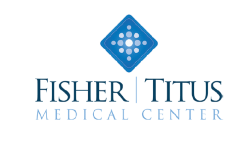As a CPA, Ben Moncher can paint pictures with numbers. But just as an artist needs canvas, brushes, and paint to begin work, Moncher needs rich, accurate data — data he’s now getting with the help of Axiom Enterprise Decision Support.
Moncher, Senior Director of Finance at Fisher-Titus Medical Center, uses numbers to communicate intricate scenarios and give leaders the intelligence they need to make informed decisions. The Norwalk, Ohio, nonprofit health system began its journey toward a single solution suite with Axiom™ Budgeting and Axiom™ Performance Reporting to build a strong foundation before adding Axiom™ Cost Accounting and Decision Support modules.
“It’s great to have one spot where we can take clinical data and mash that up with budgeting and financial data,” says Moncher, who joined Fisher-Titus in 2017.
Discovered $200K in missed billing
Once Axiom Enterprise Decision Support was fully implemented and data was moved into Axiom, Moncher and his team verified the information and began integrating new data feeds to create a central data repository — including linking professional and hospital encounters from the hospital and affiliated physician practices’ Cerner electronic health record (EHR).
Moncher and his team immediately discovered a disconnect in billing where not all physician charges were being posted. Using Axiom, Moncher developed a report that showed all hospital charges where there wasn’t a corresponding physician charge. So far, the health system has found more than $200,000 in discrepancies, caught early enough to update the charges and bill insurance within timely filing deadlines. “Even though our physician group has been fully integrated within Cerner for over a year, I continue to run this report weekly and find instances of missing professional charges,” Moncher says. “Uncovering those dropped charges was a big win for us.”
Another report helps ensure revenue integrity by identifying potential issues with charges not posting in a timely manner. Most often, the issue can be traced to one department or a particular physician. By identifying those gaps quicker, the claims process at Fisher-Titus has improved, reducing accounts receivable (A/R) days.
Becoming a data-driven organization
Among the data that Fisher-Titus pulls into Axiom Enterprise Decision Support is a monthly report that encompasses key metrics (admissions, outpatient visits, ED stats, and more) from nearby hospitals. The health system also pulls in COVID-19 data daily from across the system, including whether patients were screened before surgery or before transfer to a post-acute care facility, readmission information, and speed of COVID-19 test results. The latter statistic is particularly useful in identifying potential bottlenecks, such as lab work transfer or testing inefficiencies.
Moncher describes report building in Axiom as “fairly straightforward,” especially for those with a background in Excel. “There’s so much value in building and saving a report one time, because then the report takes a second to run and update versus taking a half-hour every month to rebuild.”
For example, the physician RVU report formerly took an analyst a full workday each month to compile. After building the report in Axiom, the process takes a couple of minutes.
“I wanted to focus on manual processes we were doing today that could be automated in Axiom,” Moncher says. “There were a lot of financial reports we would run out of Cerner, import into Excel to do formulas and mash up the data — all for one cell number to put in a report. Now those reports run automatically, with no importing data back and forth to make calculations.”
Reporting brings better strategies, decisions
Since implementing Axiom, Finance creates most of the ad hoc reports formerly managed by IT in the Cerner system. Due to complexities within Cerner and numerous vital projects, an IT report request could take up to a month to complete. Finance can complete most requests in a day or two.
During the report request phase, it’s critical that Finance asks questions of front-end users to better understand the request, which results in more actionable reporting that focuses on driving improvement or containing costs. “Report requests through finance,” Moncher says, “allow us to leverage the power of Axiom to expand a simple data request into robust analytical driven models. We’re looking at where we could capture additional market share, optimize ancillary utilization, identify lost revenue, analyze profitability, and detect gaps in quality metrics. And it works nicely with our clinical leaders, whose primary focus is on patient care.”
Included on the internal roadmap is capturing patient orders to determine how many of those imaging studies, physical therapy visits, referrals, and more actually occur and whether they occur at Fisher-Titus. Moncher says the information helps identify physicians or clinic locations that have leakage to determine how to keep more orders in house ... it remains a work in progress.
“Our data journey isn’t complete, but I feel good about where we are from a core decision support standpoint,” he says.
The actionable data coming from Axiom Enterprise Decision Support has already guided several strategic investments. Moncher says: “With Axiom we have added another layer of confidence in our decision-making, and feel we are capitalizing on new opportunities and gaining strong returns on investments.”
Read More About Axiom Enterprise Decision Support

West Tennessee Healthcare Delivers Continuous Financial, Reporting, and Clinical Quality Improvement with Axiom



